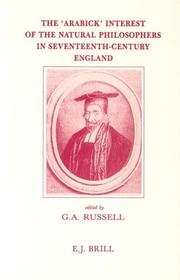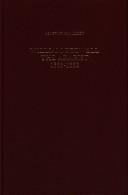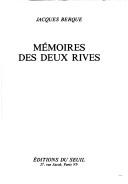| Listing 1 - 7 of 7 |
Sort by
|
Book
ISBN: 0748653147 1282059017 9786612059018 0748635483 9780748635481 9781282059016 9780748653140 0748635475 9780748635474 661205901X Year: 2008 Publisher: Edinburgh Edinburgh University Press
Abstract | Keywords | Export | Availability | Bookmark
 Loading...
Loading...Choose an application
- Reference Manager
- EndNote
- RefWorks (Direct export to RefWorks)
Pascual de Gayangos (1809-1897), celebrated Spanish Orientalist and polymath, is recognised as the father of the modern school of Arabic studies in Spain. This collection celebrates the 200th anniversary of his birth
Arabists --- Arab countries specialists --- Arabic studies specialists --- Asianists --- Middle East specialists --- Gayangos, Pascual de, --- De Gayangos, Pascual, --- Gayangos y Arce, Pascual de, --- Arce, Pascual de Gayangos y,

ISSN: 09208607 ISBN: 9004098887 9004247068 9789004098886 Year: 1994 Volume: 47 Publisher: New York, N.Y. E.J. Brill
Abstract | Keywords | Export | Availability | Bookmark
 Loading...
Loading...Choose an application
- Reference Manager
- EndNote
- RefWorks (Direct export to RefWorks)
The medieval concern with Arabic is well established. There was, however, a 'second wave' of Arabic interest in seventeenth-century Europe, which is not widely known. The essays in this volume reveal that, contrary to all expectation, the study of Arabic was pursued by a circle of natural philosophers, philologists and theologians in England in close contact with those on the Continent. Arabic was defended as an aid to biblical exegesis and as the key to a 'treasure house' of ancient knowledge. It led to the founding of Arabic chairs at Oxford and Cambridge Universities, endowed by archbishops and merchants. Arabic was taught, along with Hebrew, at Westminster school. Immense collections of Arabic manuscripts were acquired both privately and by libraries, such as the Bodleian at Oxford. They were sought after by natural philosophers in their research in observational astronomy or in the reconstruction of Greek mathematics. Arabic was also part of the Anglican interest in Eastern Churches. In addition to the earlier elegant editions of the Medici Press at Rome, bi-lingual texts, grammars, lexicons, and histories, were published by trained Arabists. Forgeries emerged based on Arabo-Latin alchemical texts. Arabic was included in the concern with a universal philosophical language. Arabic subjects featured extensively in the correspondence of the Royal Society. The impact of translated texts extended to the Quakers as well as to individual figures, such as Locke. In short, at a time when least expected, Arabic interest permeated all levels of English society, encompassing subjects which ranged from science, religion, and medicine, to typography and importing garden plants. Fourteen historians from different disciplines examine the extent and sources of this phenomenon. Arabic interest is shown to have been a significant aspect of the rise of Protestant intellectual tradition. It was also a major component of University reforms and of secular academic scholarship at Oxford and Cambridge. Thus the period also marks the institutionalisation of Arabic studies. By identifying many unexpected 'Arabick' strands in the complex skein of seventeenth-century English concerns, this volume opens new lines of investigation and challenges some of the accepted historical interpretations of the period.
Civilization, Arab --- Arabic philology --- Arabists --- Study and teaching --- History. --- History --- Great Britain --- Intellectual life --- Civilization --- Arab influences. --- 17th century --- Great Britain - Civilization - Arab influences. --- History of civilization --- Arabian [culture] --- anno 1600-1699 --- England --- Arab countries specialists --- Arabic studies specialists --- Asianists --- Middle East specialists --- Arab civilization --- Civilization, Semitic --- Islamic civilization --- cultuurgeschiedenis --- geschiedenis van de wetenschappen
Book
ISBN: 9004338624 9789004338623 9789004328143 9004328149 Year: 2017 Volume: 3 Publisher: Leiden, Boston Brill
Abstract | Keywords | Export | Availability | Bookmark
 Loading...
Loading...Choose an application
- Reference Manager
- EndNote
- RefWorks (Direct export to RefWorks)
This volume brings together the leading experts in the history of European Oriental Studies. Their essays present a comprehensive history of the teaching and learning of Arabic in early modern Europe, covering a wide geographical area from southern to northern Europe and discussing the many ways and purposes for which the Arabic language was taught and studied by scholars, theologians, merchants, diplomats and prisoners. The contributions shed light on different methods and contents of language teaching in a variety of academic, scholarly and missionary contexts in the Protestant and the Roman Catholic world. But they also look beyond the institutional history of Arabic studies and consider the importance of alternative ways in which the study of Arabic was persued. Contributors are Asaph Ben Tov, Maurits H. van den Boogert, Sonja Brentjes, Mordechai Feingold, Mercedes García-Arenal, John-Paul A. Ghobrial, Aurélien Girard, Alastair Hamilton, Jan Loop, Nuria Martínez de Castilla Muñoz, Simon Mills, Fernando Rodríguez Mediano, Bernd Roling, Arnoud Vrolijk. This title, in its entirety, is available online in Open Access.
Arabists --- Arabic language --- Study and teaching (Higher) --- History --- Arab countries specialists --- Arabic studies specialists --- Asianists --- Middle East specialists --- Semitic languages --- Arabic languages --- anno 1500-1799 --- Europe --- Arabic language - Study and teaching (Higher) - Europe - History - 17th century - Congresses. --- Arabists - Europe - History - 17th century - Congresses --- scholarship --- Arabic --- Koran --- Bible --- poetry --- orientalism --- learning --- Qur'an --- Erpenius --- Islam --- mission --- grammar --- Golius --- teaching --- textbooks --- Hebrew language --- Latin --- Quran

ISBN: 9004072411 9789004072411 Year: 1985 Publisher: Leiden Published for the Sir Thomas Browne Institute [by] E.J. Brill/Leiden University Press
Abstract | Keywords | Export | Availability | Bookmark
 Loading...
Loading...Choose an application
- Reference Manager
- EndNote
- RefWorks (Direct export to RefWorks)
Arabische studies. Engeland. 16e-17e eeuw. --- Bedwell (William). --- Arabes (Etudes). Angleterre. 16e-17e s. --- Arabists --- Arab countries specialists --- Arabic studies specialists --- Asianists --- Middle East specialists --- Bedwell, William, --- Arab countries --- Arab world --- Arabic countries --- Arabic-speaking states --- Islamic countries --- Middle East --- Study and teaching --- History.

ISBN: 2020105659 9782020105651 Year: 1989 Publisher: Paris Seuil
Abstract | Keywords | Export | Availability | Bookmark
 Loading...
Loading...Choose an application
- Reference Manager
- EndNote
- RefWorks (Direct export to RefWorks)
Arabists --- North Africanists --- Berque, Jacques, --- #SBIB:39A6 --- #SBIB:39A4 --- -North Africanists --- -North African studies specialists --- Africanists --- Arab countries specialists --- Arabic studies specialists --- Asianists --- Middle East specialists --- Etniciteit / Migratiebeleid en -problemen --- Toegepaste antropologie --- Biography --- Berque, Jacques --- Bīrk, Jāk --- Jāk Bīrk --- Jacques Berque --- جاك بيرك --- -Etniciteit / Migratiebeleid en -problemen --- Berque, J. --- North African studies specialists --- Berque, Jacques. --- Biography. --- 960 --- levensbeschrijvingen --- biographies et mémoires --- Arabists - Biography --- North Africanists - Biography --- Berque, Jacques, - 1910-1995
Book
ISBN: 9782204089593 2204089591 Year: 2010 Publisher: Paris Les Editions du Cerf
Abstract | Keywords | Export | Availability | Bookmark
 Loading...
Loading...Choose an application
- Reference Manager
- EndNote
- RefWorks (Direct export to RefWorks)
Philosophers --- Arabists --- Muslim scholars --- Christianity and other religions --- Islam --- Relations --- Christianity --- Gardet, Louis --- Islamic scholars --- Scholars, Muslim --- Scholars --- Arab countries specialists --- Arabic studies specialists --- Asianists --- Middle East specialists --- Relations&delete& --- Gardet, Louis. --- Gardet, L. --- Kardayh --- Gardayh --- Gardayh, Luwīs --- جاردية، لويس --- Mohammedanism --- Muhammadanism --- Muslimism --- Mussulmanism --- Religions --- Muslims --- 297.116*1 --- 297.116*1 Relatie Islam tot Christendom --- Relatie Islam tot Christendom --- Philosophers - France - Biography --- Arabists - France - Biography --- Muslim scholars - France - Biography --- Christianity and other religions - Islam --- Islam - Relations - Christianity
Book
ISBN: 9788843073801 884307380X Year: 2015 Publisher: Roma Carocci editore
Abstract | Keywords | Export | Availability | Bookmark
 Loading...
Loading...Choose an application
- Reference Manager
- EndNote
- RefWorks (Direct export to RefWorks)
Arabists --- Arabic language --- Islamic civilization --- Study and teaching --- History --- Marracci, Luigi, --- Catholic Church --- Clergy --- 297.116*1 --- Civilization, Islamic --- Muslim civilization --- Civilization --- Civilization, Arab --- Semitic languages --- Arab countries specialists --- Arabic studies specialists --- Asianists --- Middle East specialists --- Relatie Islam tot Christendom --- Marraccius, Ludovicus, --- Marracci, Lodovico, --- Marracci, Ludovico, --- Church of Rome --- Roman Catholic Church --- Katholische Kirche --- Katolyt︠s︡ʹka t︠s︡erkva --- Römisch-Katholische Kirche --- Römische Kirche --- Ecclesia Catholica --- Eglise catholique --- Eglise catholique-romaine --- Katolicheskai︠a︡ t︠s︡erkovʹ --- Chiesa cattolica --- Iglesia Católica --- Kościół Katolicki --- Katolicki Kościół --- Kościół Rzymskokatolicki --- Nihon Katorikku Kyōkai --- Katholikē Ekklēsia --- Gereja Katolik --- Kenesiyah ha-Ḳatolit --- Kanisa Katoliki --- כנסיה הקתולית --- כנסייה הקתולית --- 가톨릭교 --- 천주교 --- 297.116*1 Relatie Islam tot Christendom --- Église catholique
| Listing 1 - 7 of 7 |
Sort by
|

 Search
Search Feedback
Feedback About UniCat
About UniCat  Help
Help News
News